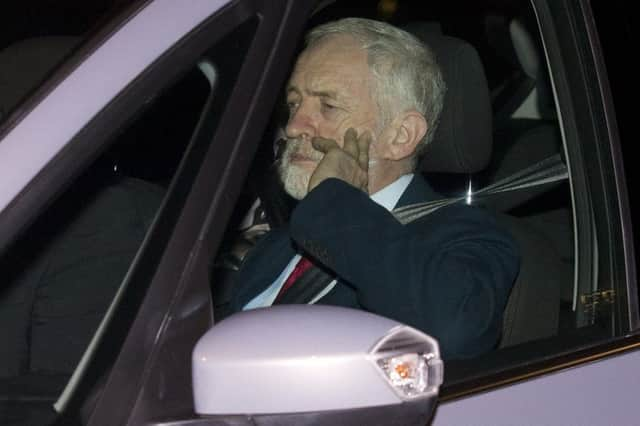Euan McColm: Corbyn’s leadership has brought nothing but strife


A career rebel, with views seemingly forged during his middle class adolescence, Corbyn is this weekend trying to prevent his shadow cabinet from falling apart. His team are sharply divided over whether the UK should participate in air strikes in Syria and the weaknesses in Corbyn’s leadership have been fully exposed.
He may have been elected on a wave of optimism (or mind-bending naivety) that said he could unite the “left” and usher in a new politics but, after little more than two months, Corbyn’s sole achievement is to have led Labour to the brink of oblivion.
Advertisement
Hide AdAdvertisement
Hide AdThe litany of disasters is long and retains the power to astonish. We’ve had shadow chancellor John McDonnell’s words of tribute to the IRA (not to mention his idiotic decision to quote from Chairman Mao’s Little Red Book in the Commons last week). Then there was Ken Livingstone’s abuse of an MP who’s suffered mental health problems. And then there was Ken, again, on Question Time just the other night explaining that the terrorists who murdered 52 people in a series of bombings in London on 7 July, 2005 “gave their lives”.
We have become quite used to the almost daily occurrence of either McDonnell or Livingstone (those great allies of Corbyn’s) saying or doing something preposterous. If neither the shadow chancellor nor the former mayor of London is available to publicly testify to their own idiocy, then the shadow international development secretary, Diane “Mao wasn’t all bad” Abbott, is also doing fine work in ensuring that Labour becomes unelectable for years to come.
Predicting Corbyn’s leadership would be catastrophic isn’t evidence of any great wisdom; his failure to unite Labour at Westminster was inevitable.
Yet the true believers – the Corbynistas – remain convinced that their man can somehow defy the laws of politics and progress from being a laughing-stock to becoming Prime Minister in five years. In saying that, I detect increasing enthusiasm from some quarters of the Labour Party for the “long game” approach, a delusion that writes off the next General Election in favour of a really cracking great win in 2025 when a 76-year-old Corbyn will sweep to power, the electorate finally having been persuaded to see the light (and to forget, once and for all, McDonnell’s repellent words of comfort for terrorists).
Of course, this is not going to happen. The Labour Party, seriously wounded by May’s General Election defeat, is now on the brink of death. You can hear the rattle.
Shadow foreign secretary Hillary Benn now defies his leader on the matter of action in Syria. Corbyn expressed his opposition to military action in a letter to Labour MPs. The spin was that Corbyn was a communicating leader. The question the situation provoked, however, was “what kind of leader has to go behind the backs of his shadow cabinet ministers to drum up support for his position?” The answer is a terrible one.
On Friday, there was the pitiful sight of McDonnell tweeting that everything was just fine and the Labour Party would be considering matters over the weekend. The message from a supposed government-in-waiting was “Chill out – it’s all cool”.
It’s getting embarrassing to watch the spectacle of Labour hacking great chunks out of itself. Yet the new and inventive ways the party finds to scupper its progress are grimly compelling.
Advertisement
Hide AdAdvertisement
Hide AdWhen it comes to Corbyn and Benn, it’s clear one of them has to go. And, that being so, the leader of the opposition will soon be looking for a new shadow foreign secretary. Some hopeful souls in Labour wonder whether Benn might be a suitable replacement for Corbyn. The family name carries currency with those of the radical left; perhaps Benn might unite the party in the event of the current leader’s abrupt departure.
This is, I think, wishful thinking by Labour moderates.
Corbyn – and, crucially, a huge swathe of his supporters – can afford not to be worried about his prospects in victory. Winning power is no use if you want to be a martyr. Corbynistas could lose General Election after General Election – something they will do if they are able to retain control of the Labour Party – and care not one whit so long as they believed themselves to be on the correct side of whatever argument they engaged in.
Corbyn’s Labour Party represents a change from the political norm. Here we have a party that doesn’t seem at all concerned about winning power.
Corbyn will, I suspect, hold on to his position for a while yet. Any moves him against him would surely have bitter consequences for agitators. The Corbynistas are deeply protective of their man and would, I believe, wreak a terrible revenge on any who dared to undermine him.
The UK Labour Party is in a crisis over Syria that threatens to leave the leader isolated in his own parliamentary group. And there is no good news ahead for moderate Labour members. Corbyn supporters now inside the party are going nowhere.
The Labour Party did not this year simply choose an unelectable leader, it opened its doors to new members who neither know nor care how to win elections.
But, just as the Corbynistas are going nowhere, neither are the moderates who remain in the parliamentary Labour Party. Tensions in the shadow cabinet reflect wider tensions among Labour MPs, the majority of whom reckoned the election of Corbyn as their leader represented a terrible error of judgment.
Corbyn’s disastrous leadership may not go the distance but, even if he can be persuaded to step down, he has made his indelible mark on the party. Whether Jeremy Corbyn survives as leader or not, Labour can look forward to a long and brutal civil war between his loyal supporters and the members who believe in the need to win elections.